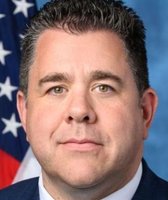Stand up for the facts!
Our only agenda is to publish the truth so you can be an informed participant in democracy.
We need your help.
I would like to contribute
Jamie Radtke says George Allen had 40,000 earmarks while senator
Tea Party organizer Jamie Radtke says George Allen was a big spender during his time in the U.S. Senate.
Allen and Radtke are among five candidates vying in next year’s Republican primary for the Senate seat occupied by Democrat Jim Webb, who will not seek reelection.
In a May 4 telephone interview with the WJHL 11 Connect television, which serves northeast Tennessee and Southwest Virginia, Radtke used a startling statistic to attack Allen’s 2001-2007 Senate term.
"He had 40,000 earmarks," she said.
Earmarks -- better known as "pork" -- are the line items inserted into larger bills that direct federal spending to specific projects. Lawmakers request the earmarks during the appropriations process, often to direct money to projects back in their home state.
Radtke’s 40,000 figure seemed bizarrely high to us. Allen served in the Senate for 2,193 days. So he would have had to request an average of 18 earmarks a day to reach that tally.
We asked Chuck Hansen, a spokesman for the Radtke campaign, where her information came from.
Hansen said Radtke’s position isn’t that Allen personally requested those items, but rather that he "voted for" 40,000 earmarks by supporting larger appropriations bills containing the line items.
"He owns all the votes for all those 40,000 earmarks even if they weren’t Virginia earmarks," Hansen said.
We’ll examine that argument in a second.
But first we should point out that Radtke has repeatedly suggested Allen requested the 40,000 earmarks.
In a Jan. 29 story in the National Journal, she was asked if Allen should have voted against the appropriations bills during his tenure.
"Well a good starting point is not to have 40,000 earmarks of your own," in those bills, Radtke was quoted as saying.
In a March 15 Twitter post, Radtke mused about the possibility of stripping the funds from "Allen’s 40,000 earmarks."
A March 25 blog post on Radtke’s website added some qualifications, but it still took Allen to task for his earmarks record.
"Allen supported nearly 40,000 earmarks during his six years in the Senate, costing taxpayers more than $90 billion," Radtke’s post said.
All this begs the question: Where did the 40,000 earmarks tally come?
Hansen said the campaign arrived at that number using figures from Citizens Against Government Waste, a conservative non-profit group that has long derided earmarks. CAGW has posted on its website an annual list of what it calls "pork projects" from fiscal years 1991-2010.
The group says the projects it counts have to fit at least one of seven criteria, among them that the line items were requested by only one house of Congress, were not subject to hearings or serve only a local interest.
Radtke’s campaign tallied 52,319 congressional earmarks for 2002-2006. Seeking a conservative estimate, Hansen said they lopped off a budget year when Allen was in the Senate and then dropped the tally to 40,000 earmarks.
Those tens of thousands of earmarks were included in appropriations bills during Allen’s term. Because Allen voted for all the appropriations bills that came up while he was in the Senate, Radtke’s campaign concluded he supported each of the 40,000 earmarks that were contained deep within those spending bills.
Is it legitimate to blame Allen for earmarks other lawmakers’ earmarks because he voted for the overall appropriations bills?
Josh Gordon, policy director at The Concord Coalition, a non-partisan organization seeking balanced federal budgets, said Radtke is leveling "kind of an absurd criticism."
"I think if you were going to criticize someone for earmarks, the more appropriate measure would be the amount of earmarks the senator requested for Virginia, and how many he got," Gordon said. "You can’t just not fund the government because one of the 535 representatives (in Congress) has a $1,000 check going to somewhere in his district."
Tad DeHaven, a budget analyst with the libertarian Cato Institute think tank, agreed the better measure of a legislator’s earmark record is whether they vote for bills containing items that they themselves requested.
But DeHaven does not give legislators a complete pass on earmark culpability when they vote for "earmark-laden" bills. "He’s still culpable for voting for the underlying bills, all the bills that contain those thousands of earmarks," DeHaven said.
It’s impossible to track down the amount of earmarks that Allen requested because when he left office in 2007, members of Congress weren’t required to disclose whether they requested a particular line item. That changed in 2008.
For what it’s worth, we dug deeper into the Citizens Against Government Waste database and found that it lists 1,135 earmarks for Virginia from 2002-2006. They could have been requested by any and all of Virginia’s 13-member congressional delegation. The total cost of those line items: about $1.2 billion according to the database.
So, where does this trip down earmark lane lead us?
Radtke, at least three times, said that Allen "had 40,000 earmarks" during his tenure in the Senate. That suggests he actually requested those line items.
Her campaign spokesman said that she means that Allen "voted for" those earmarks because that he said were included in overall appropriations bills that Allen supported.
But that’s not what she said. Her statement is False.
Our Sources
Jamie Radtke, Interview with 11 Connect, May 4, 2011.
Interview with Chuck Hansen, spokesman for the Radtke campaign, May 10, 2011.
E-mail from Chuck Hansen, May 5, 2011.
E-mails from Chuck Hansen, May 10, 2011.
Citizens Against Government Waste, earmarks database, accessed May 9, 2011.
Interview with Steve Ellis, vice president of Taxpayers for Common Sense on May 9, 2011.
Interview with Tad DeHaven, budget analyst at the Cato Institute, May 10, 2011.
Interview with Josh Gordon, policy director at the Concord Coalition, May 10, 2011.
PolitiFact Virginia article, "Jamie Radtke says debt grew by $16,000 every second of George Allen’s senate term," January, 17, 2011.
Radtke for Senate blog post, "This week in George Allen history week of March 21, 2005,", March 25, 2011.
National Journal article, "Allen challenger addresses Tea Party caucus," Jan. 29, 2011.
American Spectator article, "Too late for George Allen?," April 2011.
Jamie Radtke, Twitter post, March 15, 2011.
PolitiFact national article, "Earmarks in Stimulus? There were at least a few,"Sept. 9, 2009.
PolitiFact national article, "U.S. Rep Dave Obey says and earmarks ban would greatly weaken Congressional authority, ceding it to the executive branch,"November 18, 2010.
PolitiFact national article,"Richard Lugar says ending earmarks won’t save money," November 18, 2010.
Browse the Truth-O-Meter
More by Sean Gorman
Jamie Radtke says George Allen had 40,000 earmarks while senator
Support independent fact-checking.
Become a member!
In a world of wild talk and fake news, help us stand up for the facts.
















































